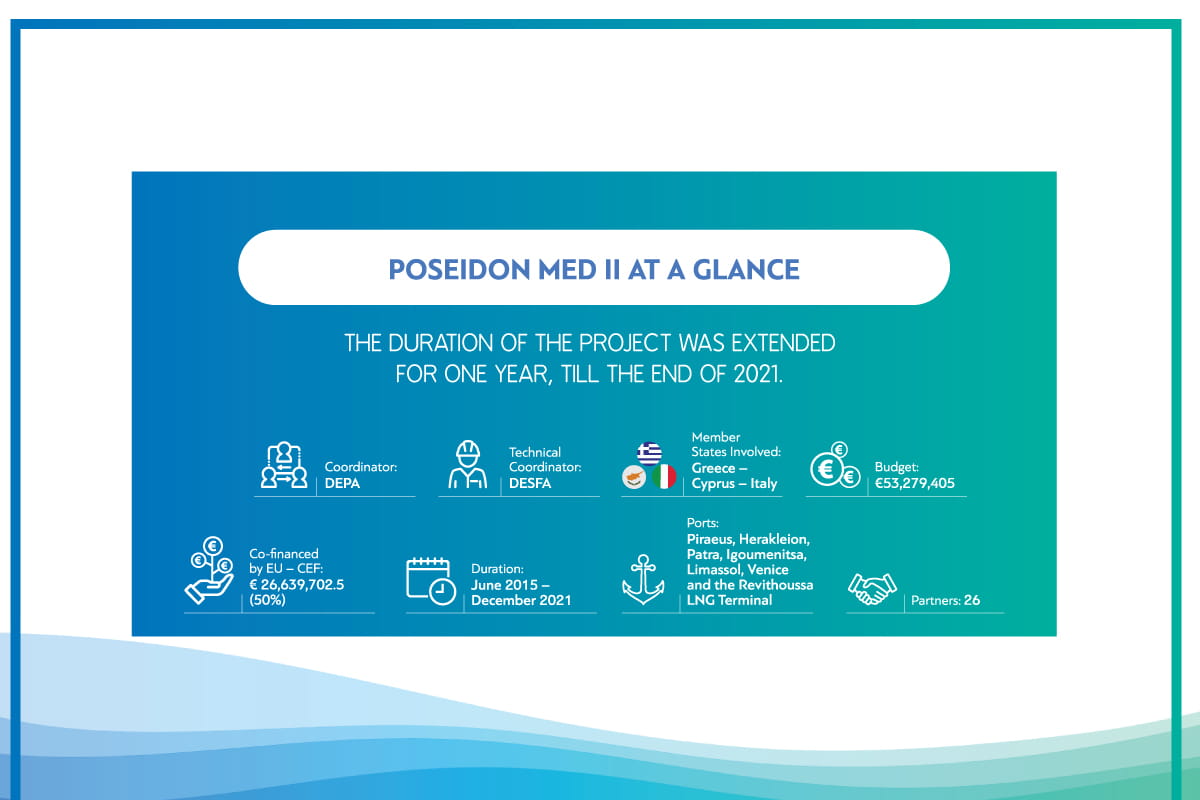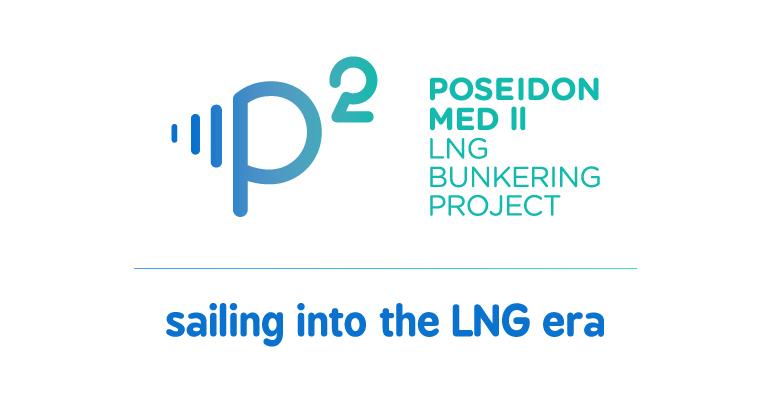Poseidon Med II (PMII) encompasses all the technical, regulatory, operational, and financial parameters required to establish a viable, efficient, and sustainable LNG supply chain in the region and unlock the necessary investments for the realization of the small-scale LNG (ssLNG) infrastructure in the area.
Under growing pressure to follow a greener “pathway” towards a decarbonized future, with an increasing number of international and European regulations and standards limiting emissions coupled with the prospect that the maritime sector will be included in the EU Emissions Trading System (EU ETS) and the establishment of an IMO emission control area (ECA) in the Mediterranean Sea on the horizon, the shipping industry needs to turn climate change targets into tangible action. Towards this, LNG offers a decarbonization pathway for the shipping industry. By investing in LNG-fuelled vessels now, ship owners can realize immediate reductions of GHG emissions on a Tank-to-Wake basis, while paving the way to carbon neutral shipping with the use of liquefied biomethane (LBM) and liquefied synthetic methane (LSM).
The increasing numbers of LNG bunkering vessels as well as LNG – fuelled vessels , illustrated by the nearly 20% growth in respective tonnage ordered last year, testify to the growing recognition of the environmental benefits of LNG as marine fuel. These investments along with the expansion of shoreside LNG infrastructure, provide the critical last-mile delivery of LNG to ships.
In 2020 the Greek Ministry of Maritime Affairs gave the “Port of Piraeus” the “green” light to start, in specific locations inside the port area, LNG bunkering operations, either from ship-to-ship or truck-to-ship.
Given the key role of the Revithoussa LNG Terminal as the “logistical springboard” of the ssLNG supply chain in the wider region, investments for small scale facilities in the terminal are underway. As a result of studies undertaken within the framework of PMII a truck loading station, for bunkering and off grid consumers’ supply, is currently under construction and will be operational by May 2022. Moreover, the basic engineering design of a new ssLNG jetty has been completed. The facility will accommodate vessels from 1.000 m3 to 28.000m3 and is expected to be operational by the first half of 2023.


With regard to ports, the respective master plans for LNG bunkering facilities for Piraeus, Patras, Heraklion, Igoumenitsa and Limassol have been completed and the permitting process for the mandatory environmental studies is being finalized. Greece's first LNG bunkering vessel, registered at the Piraeus Port and scheduled to load LNG from the nearby Revithoussa Terminal, is currently being developed.
In Cyprus, PMII has co-funded the studies for the construction of a permanent berth for the docking of LNG bunkering vessels, opposite to the jetty for the FSRU berthing in Vassilikos area.
Furthermore, in support of the shipping world’s efforts to meet the challenging IMO and EU environmental driven targets and to lead by example, PMII co-funded the realization of the design studies for the retrofitting of ten conventional fuelled vessels to run on LNG, five of which were detailed designs, as well as for a conventional and an innovative RO-PAX ferry using environmentally friendly technologies to improve propulsion and efficiency. Additionally Cost Benefit Analyses have been performed for all Ports and the ten selected vessels.
At the same time, the construction of an innovative LNG bunker vessel with a Semi Ballastable system (SBBT) is nearing completion in Italy and will operate in the Adriatic Sea.

On the regulatory framework, PMII contributed with proposals for the preparation of an "umbrella" legislation to ensure safe LNG bunkering operations at Greek Ports (Presidential Decree 64/2019). Additionally, PMII has drafted a Practical Guide to Port Authorities on how to maintain safety during LNG bunkering operations.
In order to establish an economically viable supply chain, PMII has financed a series of studies assessing the cost of LNG bunkering logistics and synergies with other sectors, such as supply with natural gas the industrial and/or the urban network of Western Greece (Patras & Igoumenitsa) and Vassilikos (Cyprus).
Furthermore, as a result of targeted dissemination events and communication action plan, stakeholders and the general public alike are better informed on the use of LNG as a maritime fuel and the importance of creating sustainable Shipping.
Poseidon Med II, has already laid the foundations for LNG bunkering in the Eastern Mediterranean, setting the example for a cleaner, more effective, competitive and sustainable marine transportation. With Poseidon Med II Eastern Mediterranean is sailing into the LNG era, in line with the IMO’s and the EU’s “Fit for 55” goals.
The sole responsibility of this publication lies with the author. The European Union is not responsible for any use that may be made of the information contained therein.
Copyright © 2024. All rights reserved. Seatrade, a trading name of Informa Markets (UK) Limited.
Add Seatrade Maritime News to your Google News feed.  |

